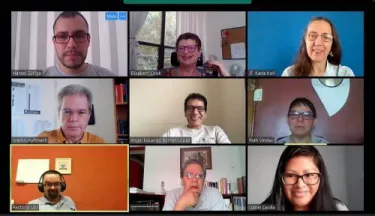Multiplying Words of Hope
A Letter from Karla Koll, serving in Costa Rica
Subscribe to my co-worker letters
Dear companions in mission,
A new academic year has begun here at the Latin American Biblical University (UBL). Virtual classrooms are open on our platform, filled with readings and activities that await students in seventeen different countries. As tasks multiplied and available resources dwindled after the start of the pandemic, I found it hard to find words and space to capture all we were experiencing as an institution. I am so grateful for the prayerful support that continued to accompany me, my colleagues, and our students, despite my silence.

Now that we are beyond 2020, my colleagues and I can look back and see how the unexpected experience of the pandemic provided many opportunities for growth. For our students, theological studies were not a luxury to be discarded as life became more difficult. Instead, our community of learning became a lifeline for people who sought meaning and accompaniment as COVID-19 brought illness, mourning, and economic distress into their lives.
In mid-March, shortly after the first cases of COVID-19 were diagnosed here in Costa Rica, the government ordered all universities to go online. While many other institutions scrambled to hold classes, after several years of teaching online, we were able to transition without missing a single class session. Even so, the switch was hard at first on the students currently in Costa Rica. They missed gathering together in our classrooms. However, once they started joining students in other countries through weekly or biweekly Zoom meetings, they embraced the new opportunities to interact and share perspectives.
Our sense of community has deepened. Faculty and department meetings, now held on Zoom, have become spaces of mutual support as each of us works from home. Support groups helped students, many of whom are pastors, process their experiences during the pandemic.
Our student numbers grew from term to term as people turned to theological studies with their questions and their pain. People under lockdown found themselves with more time to dedicate to their studies. We were able to redirect scholarship funds, originally designated for students in residence, to help people studying online cover the cost of their classes. I went from having twelve students in the first term (January through April) to having 45 students in the second term from May to August.
With larger class sizes, we were able to incorporate some of our advanced students as teaching assistants. Raquel Huertas, a professional musician with years of teaching experience, served as my assistant. She not only saved me hours by taking on many tasks but also helped me become a better teacher by teaching me new skills and applying her creativity. Larger class sizes opened up possibilities for more collaborative work on our online platform, from designing virtual museums to recordings of original songs.

When it was no longer possible to hold weekly worship services on campus, we began producing liturgies that we share online each week. An average of hundred people gathered with us every two weeks for our online seminars, a space for biblical and theological reflection. Raquel Huertas and Jessica Mora, two Costa Rican students, decided that the UBL needed a podcast. Thus far, they have produced several episodes, including one in which I explore eschatology, our hope in God's future, in times of climate change. All of these resources can be found on the Facebook page of the Universidad Bíblica Latinoamericana. We might not be able to multiple loaves and fishes to feed multitudes, but we have been able to multiply words of hope to provide spiritual food for more and more people.
I rejoice as friends in the United States receive their doses of the COVID-19 vaccine. At the same time, I wonder when our students in different countries will be able to get vaccinated. The pandemic continues to expose the inequities and lack of solidarity in the world today.
Time and time again, during the pandemic, I have turned to the eighth chapter of Paul's letter to the Christians in Rome. There is nothing, writes Paul, in life and death that can separate us from God's love for us in Christ. There has been so much illness and death. Students in Honduras, Guatemala, Peru, Panama, and Costa Rica have come down with COVID-19. Most have recovered, though some have had to pause their studies. Many in our UBL community have lost family members and/or friends to the virus. Yet, we sense that God has been with us, encouraging us toward new possibilities amid many limitations. We have grown in many ways, and we have done so with your help.
The Baltimore Orioles and Yellow Warblers who visit my garden each day will soon be heading north. They remind me of how interdependent we are. I am so thankful for the prayers and the ongoing gifts to Presbyterian World Mission that have allowed me to stay here and accompany the women and men who are seeking theological education through the Latin American Biblical University. My students, my colleagues, and I hope that we can count on your continuing support.
In the hope of God’s Reign,
Karla
